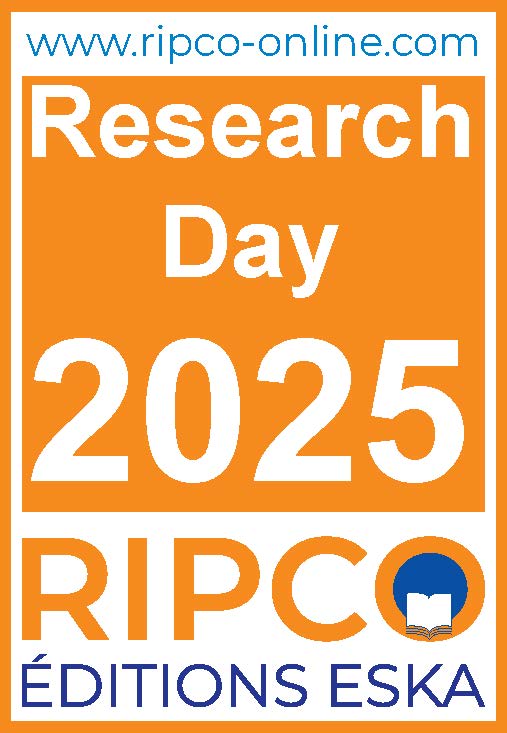| Latest news from RIPCO |
|
| |
|
 |
 |
 |
| 09/09/2025 |
|
|
| Call for papers |
|
 |
 |
 |
 |
|
Appel à contributions - Numéro spécial
"Du côté obscur : leaders et leadership destructeurs dans les organisations"
La RIPCO a le plaisir d’accueillir Valérie Petit et Lucie Gabriel comme coordinatrices de son prochain numéro spécial consacré au leadership destructeur.
Pourquoi ce numéro ?
Tyrannie, narcissisme, harcèlement, contrôle coercitif, hubris ... Les figures du leader destructeur sont multiples, parfois visibles, souvent banalisées. Leurs effets sur les individus, les collectifs et les institutions sont pourtant bien réels.
Ce numéro vise à rassembler des travaux qui éclairent les conditions d’émergence, les mécanismes, les manifestations et les conséquences de ces formes de pouvoir toxique, ainsi que les leviers de prévention et d’action.
La demande sociale, économique et sanitaire pour comprendre et prévenir ces phénomènes est aujourd’hui forte. Or, la recherche en comportement organisationnel demeure fragmentée sur ce sujet : nous encourageons donc des contributions favorisant l’intégration théorique, la discussion épistémologique, l’innovation méthodologique et des recommandations opérationnelles.
Types de contributions attendues :
- Théoriques, empiriques ou méthodologiques
- Issues du comportement organisationnel, de la psychologie du travail, de la sociologie des organisations ou des études critiques
- Proposant des analyses approfondies, des approches sensibles et/ou des pistes d’action pour les organisations
Date limite de soumission : 30 novembre 2025
L’appel complet est disponible sur notre page LinkedIn (et sur la page dédiée de notre site web : onglet NUMÉROS SPÉCIAUX/Appels à contributions)
| Read more
| Contact us |
Download |
|
|
|
 |
 |
 |
| 10/01/2025 |
|
|
| A New Chapter for RIPCO: Franck Biétry and Nicolas Raineri Take the Lead |
|
 |
 |
 |
 |
|
Starting this January, the Revue Internationale de Psychosociologie et de gestion des Comportements Organisationnels (RIPCO) welcomes its new co-editors-in-chief, Franck Biétry and Nicolas Raineri. They succeed Silvester Ivanaj, whose leadership has been instrumental in the journal's development.
Franck Biétry, University Professor at the University of Caen, specialises in organisational behaviour and human resource management. He leads two international Master's programmes at the IAE and is an active member of NIMEC, where he supervises one of the three main research areas. His work focuses on employee engagement in contexts of nomadic careers and new forms of work, as well as the quantitative assessment of workplace well-being, often from an international perspective. He has published in prestigious journals such as Organizational Research Method, Management, and Revue Française de Gestion.
Nicolas Raineri, Associate Professor at ICN Business School and a member of CEREFIGE (University of Lorraine), has extensive academic and international experience. A former associate editor of Business Ethics, the Environment & Responsibility, he has published in journals such as the Journal of Management Studies and the Journal of Business Ethics. His research explores the psychological foundations of corporate social responsibility (CSR), focusing on employee attitudes and behaviours. He is also interested in health, well-being, and meaning at work, as well as the organisational behaviour of people with disabilities.
The new co-editors-in-chief are committed to maintaining the scientific excellence, editorial rigour, and international openness that define RIPCO, while enhancing the diversity of published research. We are delighted to begin this new chapter and look forward to sharing increasingly stimulating and inspiring issues. We hope that RIPCO’s multidisciplinary approach and openness to diverse research traditions will enrich the quality of the published works while fostering constructive dialogue among researchers, practitioners, and institutions.
Franck Biétry and Nicolas Raineri, Co-editors-in-chief of RIPCO
|
|
|
 |
 |
 |
| 12/12/2024 |
|
|
| RIPCO is organising its 6th Research Day |
|
 |
 |
 |
 |
|
RIPCO is organising its 6th Research Day on Organisational Behaviour on Tuesday, 27 May 2025, at the ICN Business School campus in Paris, La Défense. This edition will focus on leadership, exploring both its promises and its pitfalls. Researchers and practitioners are invited to submit an extended abstract of their academic work, focusing on leadership and its various impacts on individuals, teams, and organisations. Contributions may include empirical studies, literature reviews, or theoretical developments. Submissions are expected by 17 March 2025, with feedback from the scientific committee provided on 27 April 2025. The event, free and open to all upon registration, will take place in person to foster exchanges and encourage dialogue among participants. For more information, please visit the event’s dedicated website.
| Read more
| Contact us |
|
|
|
| |
| Just released |
|
| |
 |
 |
 |
 |
|
| Volume XXX | Numéro 83 | 2024 | Regular Issue |
|
|
| Content |
|
|
|
|
|
|
| Read more |
 |
|
|
| |
|
|
|




